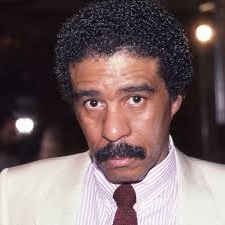Often described as one of the greatest stand-up comedians of all time, Pryor’s comedy blended raw honesty, sharp observational humor, and a deep understanding of the human condition. Through his stand-up performances, movies, and writing, Pryor not only entertained but also educated audiences on issues such as racism, poverty, and addiction.
Early Life
Richard Franklin Lennox Thomas Pryor III was born on December 1, 1940, in Peoria, Illinois. His upbringing was tumultuous, marked by poverty and family dysfunction. Raised primarily by his grandmother in a brothel, Pryor’s early experiences shaped his worldview and became a source of inspiration for his later work.
Education
Pryor’s formal education was limited due to his challenging home environment. He attended Peoria Central High School but dropped out before graduation. Despite his lack of formal education, Pryor’s sharp intellect and innate storytelling abilities set him apart.
Career
Richard Pryor’s career began in the early 1960s when he performed in small clubs and developed a conventional comedic style. However, by the late 1960s, he shifted to a raw, authentic approach that addressed racial tensions, personal struggles, and societal injustices. This transformation made him a household name.
Pryor starred in numerous films, including Silver Streak, Stir Crazy, and See No Evil, Hear No Evil. He also wrote for television shows such as The Flip Wilson Show and Sanford and Son.
Physical Measurements
Richard Pryor was 5 feet 10 inches tall (178 cm) and weighed approximately 165 pounds (75 kg). His expressive face and animated body language were key elements of his stage presence.
Awards and Honors
Pryor’s groundbreaking work earned him numerous accolades, including:
Five Grammy Awards for Best Comedy Recording.
An Emmy Award for his writing on The Lily Tomlin Show.
The first-ever Mark Twain Prize for American Humor in 1998.
A star on the Hollywood Walk of Fame.
Personal Life
Pryor’s personal life was as complex as his career. He was married seven times to five women and had seven children. He struggled with substance abuse but often used his experiences as material for his comedy.
Challenges and Obstacles
Pryor faced numerous challenges throughout his life, including poverty, addiction, health issues, and societal discrimination. In 1980, he survived a near-fatal accident after setting himself on fire during a drug-related incident. Despite these obstacles, he continued to create and perform, using his struggles as fuel for his art.
Achievements and Successes
Pryor’s achievements are vast, ranging from groundbreaking comedy albums to iconic film roles. He broke barriers for African American entertainers and inspired a generation of comedians with his fearless honesty and unique perspective.
Legacy
Richard Pryor’s influence on comedy and culture is immeasurable. He paved the way for comedians like Eddie Murphy, Chris Rock, and Dave Chappelle, who credit him as a primary influence.
Philosophy and Values
Pryor’s work reflected a deep belief in authenticity and the power of humor to address painful truths. He valued honesty, resilience, and the ability to find light in even the darkest situations.
Influences and Mentors
Pryor was influenced by comedians like Lenny Bruce, Redd Foxx, and Dick Gregory, who used humor to challenge societal norms and provoke thought.
Notable Works
Some of Pryor’s most famous works include:
That N**r’s Crazy (1974)
Is It Something I Said? (1975)
Live on the Sunset Strip (1982)
Films like Harlem Nights and The Toy.
Publications and Media
Pryor co-wrote his autobiography, Pryor Convictions and Other Life Sentences, which provides an intimate look at his life and career.
Professional Memberships
Pryor was a member of the Writers Guild of America and was actively involved in the entertainment industry.
Community Involvement
Pryor advocated for civil rights and supported various charitable organizations, including those focused on multiple sclerosis, a disease he battled in his later years.
Hobbies and Interests
Pryor loved animals and owned a ranch where he cared for numerous pets. He also enjoyed painting and spending time with his family.
Travel and Exploration
Pryor’s career took him across the globe, where he performed for diverse audiences and explored different cultures.
Health and Wellness
In the late 1980s, Pryor was diagnosed with multiple sclerosis, a condition that significantly impacted his mobility and career. Despite this, he remained active and continued to inspire others.
Spirituality and Faith
Pryor’s later years were marked by a search for spiritual meaning and self-reflection. He often spoke about finding peace through love and acceptance.
Legacy and Impact
Richard Pryor’s legacy is one of courage, innovation, and authenticity. He redefined comedy and left an indelible mark on American culture.
Quotes and Wisdom
“I believe in divine forces, and I believe in faith.”
“The truest comedy comes from the darkest pain.”
Lessons Learned
Pryor’s life teaches resilience, the importance of self-expression, and the power of laughter to heal and unite.
Challenges and Lessons
His struggles with addiction and health issues underscore the importance of seeking help and embracing vulnerability.
Personal Growth and Development
Pryor continually evolved as a performer and a person, using his experiences to fuel his art and inspire change.
Thoughts and Reflections
Pryor often reflected on his life with a mix of humor and honesty, acknowledging his flaws while celebrating his achievements.
Timeline
1940: Born in Peoria, Illinois.
1960: Began performing in clubs.
1970: Rose to fame with groundbreaking comedy albums.
1980: Survived a near-fatal accident.
1998: Received the Mark Twain Prize for American Humor.
2005: Passed away from a heart attack.
Family Tree
Pryor had seven children from his marriages and maintained close relationships with his extended family.
Relationships
Pryor’s relationships were often tumultuous, but he maintained deep connections with friends and colleagues who supported him throughout his life.
Career Highlights
Transforming stand-up comedy with his raw, honest style.
Starring in iconic films like Silver Streak.
Winning multiple Grammy and Emmy awards.
Facts
Pryor was the first comedian to win the Mark Twain Prize for American Humor.
He overcame significant obstacles to become a cultural icon.
FAQs
Q: What made Richard Pryor unique?
A: His fearless approach to comedy and ability to blend humor with social commentary.
Q: How did Pryor influence comedy?
A: He paved the way for comedians to address taboo topics and embrace authenticity.
Conclusion
Richard Pryor was a trailblazer whose work transcends time. His legacy as a comedian, actor, and cultural icon continues to inspire and entertain audiences worldwide.

